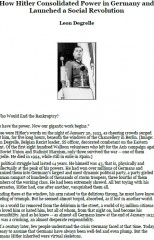
Author : Degrelle Léon
Title : How Hitler consolidated power in Germany and launched a social revolution
Year : 1992
Link download : Degrelle_Leon_-_How_Hitler_consolidated_power_in_Germany_and_launched_a_social_revolution.zip
Who Would End the Bankruptcy ? "We have the power. Now our gigantic work begins." Those were Hitler's words on the night of January 30, 1933, as cheering crowds surged past him, for five long hours, beneath the windows of the Chancellery in Berlin. (Image: Leon Degrelle, Belgian Rexist leader, SS officer, decorated combatant on the Eastern Front. Of the first eight hundred Walloon volunteers who left for the Axis campaign against the Soviet Union and Stalinist Marxism, only three survived the war - one of them Degrelle. He died in 1994, while still in exile in Spain.) His political struggle had lasted 14 years. He himself was 43, that is, physically and intellectually at the peak of his powers. He had won over millions of Germans and organized them into Germany's largest and most dynamic political party, a party girded by a human rampart of hundreds of thousands of storm troopers, three fourths of them members of the working class. He had been extremely shrewd. All but toying with his adversaries, Hitler had, one after another, vanquished them all. Standing there at the window, his arm raised to the delirious throng, he must have known a feeling of triumph. But he seemed almost torpid, absorbed, as if lost in another world. It was a world far removed from the delirium in the street, a world of 65 million citizens who loved him or hated him, but all of whom, from that night on, had become his responsibility. And as he knew - as almost all Germans knew at the end of January 1933 - this was a crushing, an almost desperate responsibility. Half a century later, few people understand the crisis Germany faced at that time. Today, it's easy to assume that Germans have always been well-fed and even plump. But the Germans Hitler inherited were virtual skeletons. During the preceding years, a score of "democratic" governments had come and gone, often in utter confusion. Instead of alleviating the people's misery, they had increased it, due to their own instability: it was impossible for them to pursue any given plan for more than a year or two. Germany had arrived at a dead end. In just a few years there had been 224,000 suicides - a horrifying figure, bespeaking a state of misery even more horrifying. By the beginning of 1933, the misery of the German people was virtually universal. At least six million unemployed and hungry workers roamed aimlessly through the streets, receiving a pitiful unemployment benefit of less than 42 marks per month. Many of those out of work had families to feed, so that altogether some 20 million Germans, a third of the country's population, were reduced to trying to survive on about 40 pfennigs per person per day. Unemployment benefits, moreover, were limited to a period of six months. After that came only the meager misery allowance dispensed by the welfare offices. Notwithstanding the gross inadequacy of this assistance, by trying to save the six million unemployed from total destruction, even for just six months, both the state and local branches of the German government saw themselves brought to ruin: in 1932 alone such aid had swallowed up four billion marks, 57 percent of the total tax revenues of the federal government and the regional states. A good many German municipalities were bankrupt. (Image: "Our Last Hope: Hitler"; by NS artist Mjolnir.) Those still lucky enough to have some kind of job were not much better off. Workers and employees had taken a cut of 25 percent in their wages and salaries. Twenty-one percent of them were earning between 100 and 250 marks per month; 69.2 percent of them, in January 1933, were being paid less than 1,200 marks annually. No more than about 100,000 Germans, it was estimated, were able to live without financial worries. During the three years before Hitler came to power, total earnings had fallen by more than half, from 23 billion marks to 11 billion. The average per capita income had dropped from 1,187 marks in 1929 to 627 marks, a scarcely tolerable level, in 1932. By January 1933, when Hitler took office, 90 percent of the German people were destitute. No one escaped the strangling effects of the unemployment. The intellectuals were hit as hard as the working class. Of the 135,000 university graduates, 60 percent were without jobs. Only a tiny minority was receiving unemployment benefits. "The others," wrote one foreign observer, Marcel Laloire (in his book New Germany), "are dependent on their parents or are sleeping in flophouses. In the daytime they can be seen on the boulevards of Berlin wearing signs on their backs to the effect that they will accept any kind of work." But there was no longer any kind of work. The same drastic fall-off had hit Germany's cottage industry, which comprised some four million workers. Its turnover had declined to 55 percent, with total sales plunging from 22 billion to 10 billion marks. Hardest hit of all were construction workers; 90 percent of them were unemployed. Farmers, too, had been ruined, crushed by losses amounting to 12 billion marks. Many had been forced to mortgage their homes and their land. In 1932 just the interest on the loans they had incurred due to the crash was equivalent to 20 percent of the value of the agricultural production of the entire country. Those who were no longer able to meet the interest payments saw their farms auctioned off in legal proceedings: in the years 1931- 1932, 17,157 farms - with a combined total area of 462,485 hectares - were liquidated in this way. The "democracy" of Germany's "Weimar Republic" (1918-1933) had proven utterly ineffective in addressing such flagrant wrongs as this impoverishment of millions of farm workers, even though they were the nation's most stable and hardest working citizens. Plundered, dispossessed, abandoned: small wonder they heeded Hitler's call. Their situation on January 30, 1933, was tragic. Like the rest of Germany's working class, they had been betrayed by their political leaders, reduced to the alternatives of miserable wages, paltry and uncertain benefits, or the outright humiliation of begging. Germany's industries, once renowned everywhere in the world, were no longer prosperous, despite the millions of marks in gratuities that the financial magnates felt obliged to pour into the coffers of the parties in power before each election in order to secure their cooperation. For 14 years the well-blinkered conservatives and Christian democrats of the political center had been feeding at the trough just as greedily as their adversaries of the left. Thus, prior to 1933, the Social Democrats had been generously bribed by Friedrich Flick, a supercapitalist businessman. With him, as with all his like, it was a matter of carefully studied tactics. After 1945, his son, true to tradition, would continue to offer largess to the Bundestag Socialists who had their hands out, and, in a roundabout way, to similarly minded and equally greedy political parties abroad as well. The benefactors, to be sure, made certain that their gifts bore fruit in lucrative contracts and in cancelled fiscal obligations. Nothing is given for nothing. In politics, manacles are imposed in the form of money. Even though they had thus assured themselves of the willing cooperation of the politicians of the Weimar system's parties, the titans of German capitalism had experienced only a succession of catastrophes. The patchwork governments they backed, formed in the political scramble by claim and compromise, were totally ineffective. They lurched from one failure to another, with neither time for long-range planning nor the will to confine themselves somehow to their proper function. ...

Demolins Edmond - Saint Louis
Auteur : Demolins Edmond Ouvrage : Saint Louis Année : 19881 Lien de téléchargement :...














